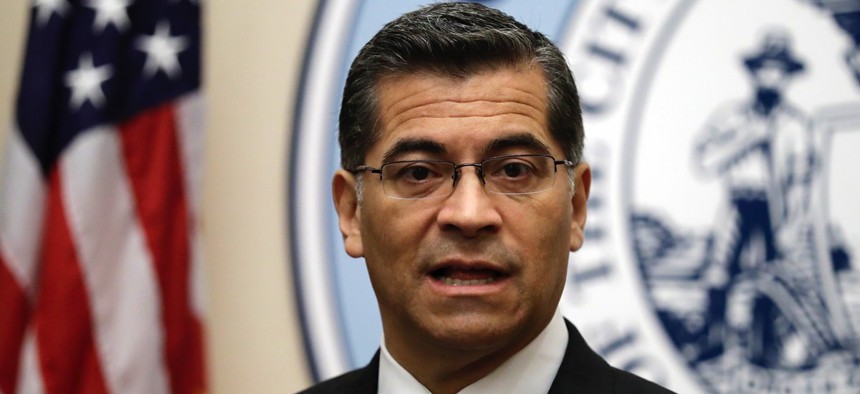California Becomes First State to Challenge Sessions on New Grant Rules for ‘Sanctuary Cities’

California Attorney General Xavier Becerra speaks during a press conference at San Francisco City Hall on Monday. Marcio Jose Sanchez / AP Photo

Connecting state and local government leaders
The U.S. attorney general may ultimately be forced to craft new regulations, at a time when President Trump wants less.
California became the first state to challenge the U.S. Department of Justice’s action to withhold public safety grants from so-called “sanctuary city” jurisdictions, joining San Francisco’s lawsuit in U.S. District Court.
U.S. Attorney General Jeff Sessions announced in late July that recipients of 2017 Edward Byrne Memorial Justice Assistance grants—the primary source of federal criminal justice funding for state and local governments—must prove Immigration and Customs Enforcement personnel are allowed into their detention facilities and receive 48 hours’ notice prior to release of wanted undocumented immigrants.
The city and county of San Francisco—and now the state of California—argue that the Justice Department needs congressional consent to withhold funds from a previously authorized program.
“It’s a low blow to our men and women who wear the badge, for the federal government to threaten their crime-fighting resources in order to force them to do the work of the federal government when it comes to immigration enforcement,” state Attorney General Xavier Becerra said during a press conference in San Francisco on Monday, according to the Los Angeles Times.
The state received $28 million out of the $383.5 million in Byrne JAG grants awarded this year for police, courts, crime prevention, corrections, drug treatment, technology, and victim services initiative.
Sessions asserted DOJ’s right to claw back such funds, which Becerra called “bullying.”
Sanctuary state legislation is working its way through California’s legislature, which would bar local police from enforcing federal immigration laws—proponents arguing it’s in line with the 10th Amendment separation of powers.
Another condition Sessions is attempting to write into grant language is that jurisdictions certify compliance with 8 U.S.C. 1373, which prohibits them from stopping employees informing federal agents of a person’s immigration status. Many states and localities direct law enforcement not to ask for such information as a workaround.
Should the court find Sessions has unilaterally applied unrelated conditions to criminal justice grants, without basis in the program’s statute, he would be forced to go through the lengthy process of drafting new regulations—at a time when President Trump is trying to reduce the number on the books. That involves creating the language, publishing it in the Federal Register, allowing for comments and discussion, and undergoing an Office of Management and Budget review.
Sessions and ICE Acting Director Tom Homan are headed to Miami-Dade County, Florida, for an event on Wednesday, per a DOJ media advisory, where they intend to highlight the jurisdiction’s increased compliance with federal immigration authorities.
Dave Nyczepir is a News Editor at Government Executive’s Route Fifty and is based in Washington, D.C.

NEXT STORY: Durham's Confederate Statue Comes Down





